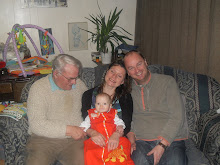A Reflection for Easter. Andrew Bebb
I remember many years ago watching an interview on the television. The theme appeared to be an exploration of the problem of evil and suffering in human life. The interviewer had chosen to interview a fairly young couple. They were sitting together on a sofa in a modestly furnished room of a rented council house in the North of England. Held against the bosom of the woman, with her arms clasped around the neck of her mum and her legs around her waist, was a young girl, about four years old. Although the child’s eyes were open, they were expressionless as was the young girl’s face. The mouth hung open and the tongue lolled within it. The child’s body was quite incapable of any independent movement or response, let alone that of speech.
We learned from the interviewer that the child was bereft of any form of communication and every movement had to be gently controlled by the parents. We were shown a scene in the small garden at the back of the house where the child had been brought to enjoy the sun and fresh air. Although there was no indication of any pleasure in the child’s demeanour.
The interviewer began to probe the feelings of the parents.
‘Here you are,’ he said, ‘I understand that you are unable to have any other child. She is the only child you will ever have. This little girl you are holding is quite unable to make any kind of reaction to your loving and gentle handling of her. So it will continue for many years into the future. Do you not think that you have been dealt a very unjust hand? Do you not feel any bitterness because of it?’
The young father looked at his wife in bemusement and for a while there was silence. ‘I don’t know about that’ he said, ‘I don’t think we’ve ever thought about it. One thing we do know though. Our little girl will know only one thing in her life. That is the love that we give her. To take that away. That would be an injustice.’
For myself, I have never forgotten that image. It was the finest expression of human dignity I have ever encountered. It has helped me to begin to understand the place of suffering and imperfection in human life. Let me try to explain how.
That little girl with all her limitations and total self-enclosure had managed to draw out of her parents a depth of selfless love and joy that most of us will never begin to educe from those we spend our lives among. It helped me to begin to understand the meaning and purpose of God in creating this so imperfect world.
Again many years ago as a young adolescent, I remember reading in the preface of a missionary magazine a mysterious phrase. ‘It is the sinner,’ it said strangely ‘who is closest to the heart of Christ.’ It has taken me many years even to begin to understand that odd statement.
We spend our lives in a broken, imperfect world. Love grows out of our outstretched hands. As we reflect upon, admit, and accept our imperfections, our sinfulness, our unattractiveness, our abiding weaknesses, our hidden shames, we open up a space for love to be generated in the enclosed hearts of others and through them to the God who cares beyond all imaginings. The One who numbers the hairs on our head, who knows the dying flight of the sparrow as it plunges to the earth.
It is only in our emptiness and fragility that there can be room for love to enter in.
When on Easter morning, the Deacon sings that great hymn of joy, the Exultet, he sings of that ‘happy fault which merited so great a Redeemer’. It seems such a strange thing to be joyful for! Original sin? Our weaknesses? Our propensity to shame ourselves with our failings? Surely not.
And yet that is precisely what the whole Church rejoices in as it celebrates the resurrection of Christ.
It is the sinner kneeling in the shadows beating his breast muttering: ‘Lord, have pity on me, an unworthy outcast’, who goes back to his house justified, not the boastful righteous ones who are busy congratulating themselves on their piety standing at the front. It is the criminal hanging on his gallows beside Jesus and asking to be remembered in the Kingdom, who is promised a place in Paradise that very day!
These are the chosen ones. What a strange message does the Lord bring! He comes to call sinners not the upright!
Deep in shame
Years of perfidy
Pressed down upon me.
In the bench
Beyond the sacred encounter
Quiet tears ran.
The unseen head pressed upon my chest.
‘Be still. All is well’
Tuesday, 7 September 2010
Subscribe to:
Post Comments (Atom)

No comments:
Post a Comment